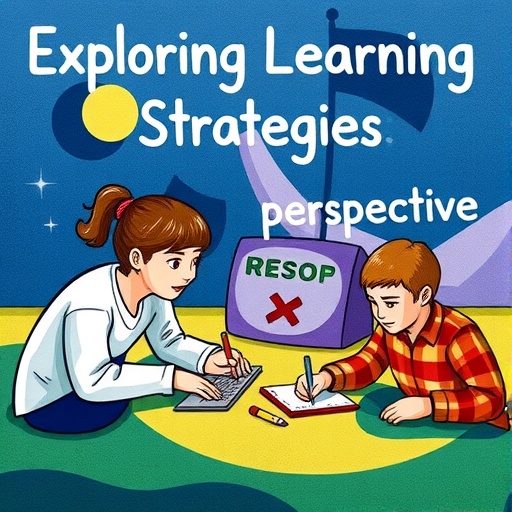In a rapidly evolving educational landscape, the exploration of learning strategies has taken on newfound urgency, especially as our understanding of cognitive processes and habits deepens. Recent research led by A. K. Krause, J. Breitwieser, and G. Brod sheds light on the intersection of habit formation and the use of learning strategies, providing a compelling framework for educators and students alike. Their work is set to be published in the upcoming issue of the Educational Psychologist Review, emphasizing the critical nature of understanding how habits influence learning.
At the heart of this research lies the idea that learning strategies are not merely techniques adopted when studying or engaging with material; they are often habitual behaviors that students develop over time. These habits influence how information is processed, retained, and recalled, and the authors propose that without an awareness of these habitual learning strategies, interventions could be less effective. This shift in perspective encourages a more nuanced approach to teaching, one that recognizes the power of habits in shaping academic success.
The study notably examines how habitual learning strategies can vary widely among students. While some students may gravitate towards rote memorization or repetitive review, others may develop more sophisticated, self-regulated approaches that promote deeper understanding. The implications of these findings are profound, suggesting that instructional design must take into account the diverse habitual practices that students bring to their learning environments.
Krause and her colleagues also highlight the role of motivation and self-efficacy in the adoption of effective learning strategies. Students who believe in their ability to learn tend to experiment with different strategies, ultimately leading to the formation of effective habits. Conversely, those with lower self-efficacy may resort to less effective strategies, potentially stunting their academic growth. This relationship poses questions regarding how educators can foster a growth mindset and enhance students’ motivation to engage with their learning processes.
One of the innovative aspects of Krause’s research is its methodological approach. Utilizing a mixed-methods strategy, the authors combined quantitative surveys to assess habitual strategies with qualitative interviews that provided deeper insights into students’ experiences. This combination allows for a richer understanding of the complexities surrounding learning habits, enabling stakeholders in education to develop more targeted interventions.
Crucially, the authors propose that interventions must be habitually focused. Traditional pedagogical approaches often prioritize knowledge delivery without assessing the habitual frameworks that students operate within. By explicitly teaching strategies that students can integrate into their daily routines, educators can facilitate a more sustainable and effective learning process. This idea challenges longstanding paradigms in education and calls for a reconceptualization of how learning strategies are taught and reinforced.
Moreover, the study underscores the significance of environmental factors in shaping learning habits. Factors such as classroom dynamics, available resources, and peer interactions play a critical role in the habitual strategies that students adopt. Understanding the broader context of learning environments can provide insights into disparities in academic achievement, allowing educators to address potential inequalities head-on.
The implications of this research extend beyond the classroom, touching on lifelong learning and the development of professional skills. In a world where knowledge is constantly evolving, understanding how to cultivate effective learning habits will be essential for success in any field. The ability to adapt and restructure learning strategies in response to changing demands can empower individuals to take charge of their educational journeys.
As the discussion surrounding educational practices grows ever more intricate, Krause and her colleagues’ research presents an opportunity to revisit the importance of habit formation in learning. The authors advocate for more comprehensive training for educators, emphasizing methods that account for the habitual nature of learning strategies. By designing curricula that align with students’ existing habits, educational programs can achieve greater efficacy.
The research also raises important questions about how learning strategies are assessed. Current assessment practices often overlook the habitual processes influencing student performance. Incorporating an understanding of these dynamics into evaluation frameworks could lead to more equitable assessments that accurately reflect student potential and understanding.
In summary, Krause, Breitwieser, and Brod’s investigation into learning strategy use through the lens of habit offers valuable insights for various stakeholders in education. As the field continues to evolve, adapting to new challenges requires a deeper understanding of the intrinsic habits that shape learning experiences. By prioritizing research that connects habit formation with educational outcomes, we can ensure that we provide the necessary scaffolding for students to thrive.
Ultimately, this research signifies a step towards a more holistic understanding of learning. By viewing learning strategies as habitual processes rather than isolated techniques, educators may find more effective ways to nurture and support student success. As this work resonates throughout educational discourse, it is likely to influence practices that promote robust, adaptive learning environments, fostering greater academic achievement for all students.
Subject of Research: Learning strategy use through the lens of habit.
Article Title: Understanding Learning Strategy Use Through the Lens of Habit.
Article References: Krause, AK., Breitwieser, J. & Brod, G. Understanding Learning Strategy Use Through the Lens of Habit. Educ Psychol Rev 37, 109 (2025). https://doi.org/10.1007/s10648-025-10087-3
Image Credits: AI Generated
DOI: https://doi.org/10.1007/s10648-025-10087-3
Keywords: Learning strategies, habit formation, education, motivation, self-efficacy, instructional design, academic success, mixed-methods research, lifelong learning, educational practices, assessment.




